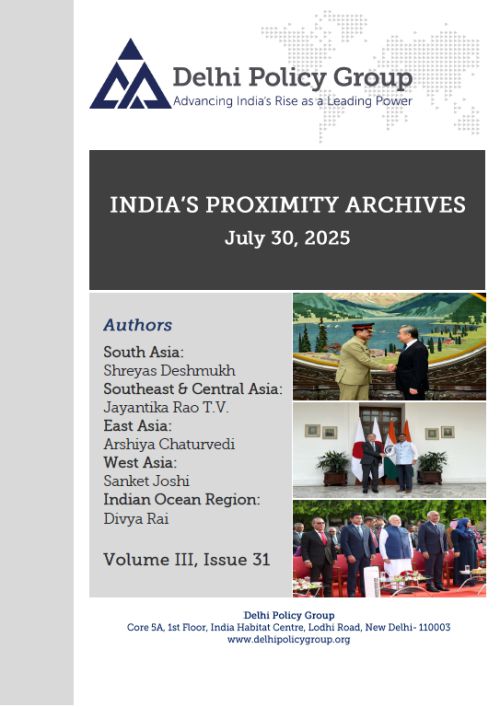India’s Proximity Archives
South Asia
During his visit to China on July 24, Field Marshal Asim Munir, the Pakistan Army Chief, held meetings with General Zhang Youxia, Vice Chairman of the Central Military Commission (CMC), General Chen Hui, Political Commissar of the PLA Army, and Lieutenant General Cai Zhai Jun, Chief of Staff of the PLA Army. He also met with Vice President Han Zheng and Foreign Minister Wang Yi. During discussions, Minister Wang Yi affirmed China’s support for Pakistan’s determined endeavours to counter all forms of terrorism. He expressed the hope that the Pakistani military would persist in its comprehensive efforts to ensure the safety of Chinese personnel, projects, and institutions within Pakistan. Their talks emphasized defense modernisation, counterterrorism programs, joint military exercises, and improved institutional collaboration.
Southeast Asia
Following a meeting with Cambodian Prime Minister Hun Manet and acting Thai Prime Minister Phumtham Wechayachai in Kuala Lumpur, Malaysian Prime Minister and the ASEAN Chair Anwar Ibrahim announced a ceasefire between Thailand and Cambodia on July 28. The ceasefire came into effect at midnight, on July 29. According to the Thai Army spokesman Major Gen. Winthai Suvaree, both sides agreed to halt troop movements, avoid escalation and establish coordination teams before a joint border committee meeting in Cambodia on August 4.
East Asia
From July 27 to 29 Japanese Vice Minister for Foreign Affairs Funakoshi Takehiro visited New Delhi to hold meetings with Indian officials, including Foreign Secretary Vikram Misri and Principal Secretary to the Prime Minister Dr. Pramod Kumar Mishra. In the meeting with Mr. Misri on July 28, the two leaders discussed strengthening Japan-India ties across security, economic, and people-to-people domains, particularly in the context of Prime Minister Modi’s upcoming visit to Japan. They also reaffirmed their nations' commitment to cooperation within the Quad framework to promote a free and open Indo-Pacific and agreed to maintain close coordination on regional and global issues.
West Asia
On July 24, French President Emmanuel Macron announced his decision to recognise the State of Palestine at the United Nations General Assembly scheduled to be held in September 2025 in New York. As the humanitarian crisis in Gaza continues to worsen, President Macron stressed the importance of an immediate ceasefire between Israel and Hamas, the release of all hostages, enabling humanitarian aid, and the establishment of a demilitarised Palestinian State that would lead to peace in the region. President Trump expressed concerns about a humanitarian catastrophe in Gaza, including images of children starving. In response to claims of starvation, Israeli Prime Minister Benjamin Netanyahu stated that the IDF had allowed enough humanitarian aid to reach Gaza. However, Hamas intercepts the supplies and accuses Israel of preventing their entry into Gaza.
Central Asia
On July 25, Tajik authorities launched a new wave of deportations targeting Afghan refugees and asylum seekers, sparking alarm among rights groups and in the United Nations. Afghan Christian converts who fled Taliban persecution and sought refuge in Tajikistan have also told British media that they are under threat of detention and deportation. Many have warned that being returned to Afghanistan could be a death sentence, given the Taliban’s hostility toward religious minorities. Additionally, UNHCR and other rights groups have pointed out that some of those being deported are employees or military personnel from the ousted Afghan government who could face ill-treatment and possibly execution back in Afghanistan.
Indian Ocean Region
Prime Minister Narendra Modi paid a state visit to the Maldives from July 25 to 26, to serve as the Guest of Honour at the Maldives’ 60th Independence Day celebrations, being the first Indian Prime Minister to attend this event. Key highlights of the visit included comprehensive bilateral talks with President Mohamed Muizzu, during which they reviewed progress on the India-Maldives Joint Vision for a Comprehensive Economic and Maritime Security Partnership adopted in 2024. India extended a significant ₹4,850 crore (approximately USD 565 million) Line of Credit to support Maldivian infrastructure and economic development and restructured existing debts to ease repayment burdens. Additionally, the two leaders signed six Memoranda of Understanding (MoUs) covering areas such as fisheries cooperation, pharmacopoeia, meteorology, digitalisation, and infrastructure development.



